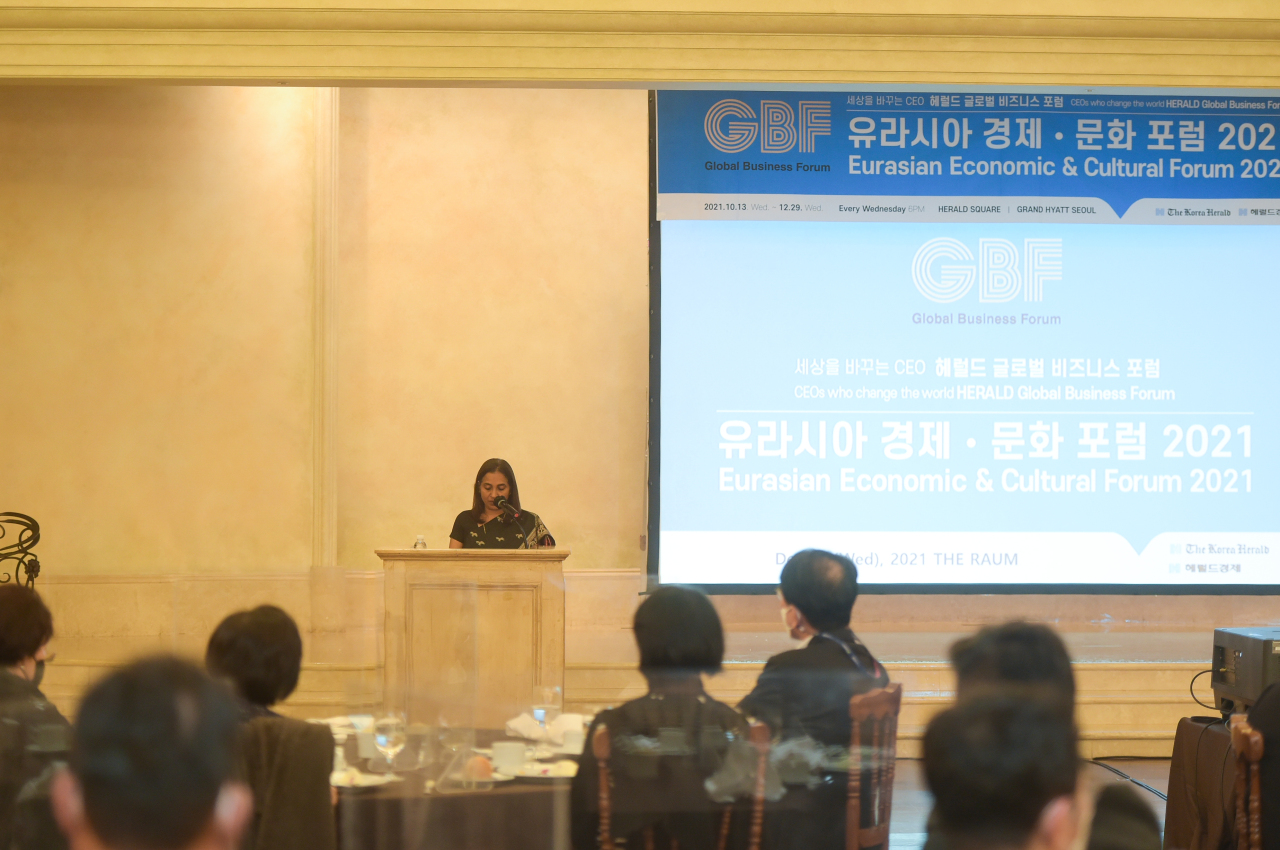 |
Indian Ambassador to Korea Sripriya Ranganathan delivers the opening remarks for the 10th day of the Eurasian Economic and Cultural Forum 2021, hosted by The Korea Herald in Seoul. (Sanjay Kumar/The Korea Herald) |
India is an attractive investment destination for Korean entities, with the country’s $1.4 trillion infrastructure development plan representing attractive opportunities, Indian Ambassador to Korea Sripriya Ranganathan said at the Eurasian Economic and Cultural Forum 2021, hosted Wednesday by The Korea Herald.
The ambassador said that the size of Indian economy, India’s infrastructure development plans, demography and digital ecosystem, outstanding human resource, private equity, venture capital investments amid COVID-19 and startup initiatives make India an attractive destination for Korean companies.
Ranganathan said that India has the sixth-largest economy in the world, and that India’s gross domestic product is returning to pre-pandemic levels.
“Global investor confidence is clear in India’s cumulative FDI (foreign direct investment) today at $749 billion and cumulative foreign institutional investors $258 billion,” she said.
According to Ranganathan, India is to execute 7,400 infrastructure projects totaling $1.5 trillion by 2026 that offer huge opportunities to foreign investors and engineering, procurement and construction contractors.
She emphasized that Korean firms can bid for contracts and receive favorable terms of credit.
Ranganathan said India has a demographic advantage with 65 percent of Indians in the 15-64 age band, a median age of 26.7 years old and the highest working-age population in the world.
 |
Indian Ambassador to Korea Sripriya Ranganathan encourages Korean companies to diversify manufacturing and supply base between India and Korea, amid COVID-19. (Sanjay Kumar/The Korea Herald) |
“Korean companies can leverage India’s wealth of skilled professionals and technical manpower with excellent IT and English language skills to enhance their own competitiveness,” Ranganathan said, adding that India has the second highest number of science, technology, engineering, and mathematics graduates, and the third-largest pool of scientists and technicians in the world, which can facilitate Korean companies grappling with the challenge of a shrinking and graying workforce.
Citing India’s 700 million internet users, 1.18 billion mobile phone subscribers and demand for smart gadgets like mobile phones and electric vehicles among Indians, she encouraged Korean companies to grasp opportunities in mobile hardware, services, big data and computing.
Ranganathan suggested diversifying manufacturing and supply base between India and Korea amid COVID-19 and enhancing cooperation in export competitiveness as well as investments in steel, shipbuilding and electronic and digital technologies.
Citing the example of Hyundai Motor, she highlighted the benefits the countries could reap by collaborating. According to the ambassador, 70 percent of Hyundai cars produced in India are sold locally, and the remaining 30 percent are exported to a third market.
The ambassador introduced India’s climate change mitigation commitments on the sidelines of COP26, quoting Indian Prime Minister Narendra Modi’s announcement that India’s non-fossil fuel capacity would be enhanced to 500 gigawatts by 2030, that 450 gigawatts renewable energy capacity would be created by 2030 and carbon net zero neutrality would be achieved by 2070.
Ranganathan encouraged Korean companies to cooperate in India’s green hydrogen mission to meet climate goals and manufacture green hydrogen.
She affirmed India and Korea are natural partners that have sealed a special strategic partnership complementing India’s Act East Policy and Korea’s New Southern Policy Plus to support each other’s national objectives.
“Birds build their nests on a windy day so they can withstand strong winds,” the ambassador said, urging India and Korea to partner amid the hard times of COVID-19 and prove their mettle.
By Sanjay Kumar (
sanjaykumar@heraldcorp.com)









